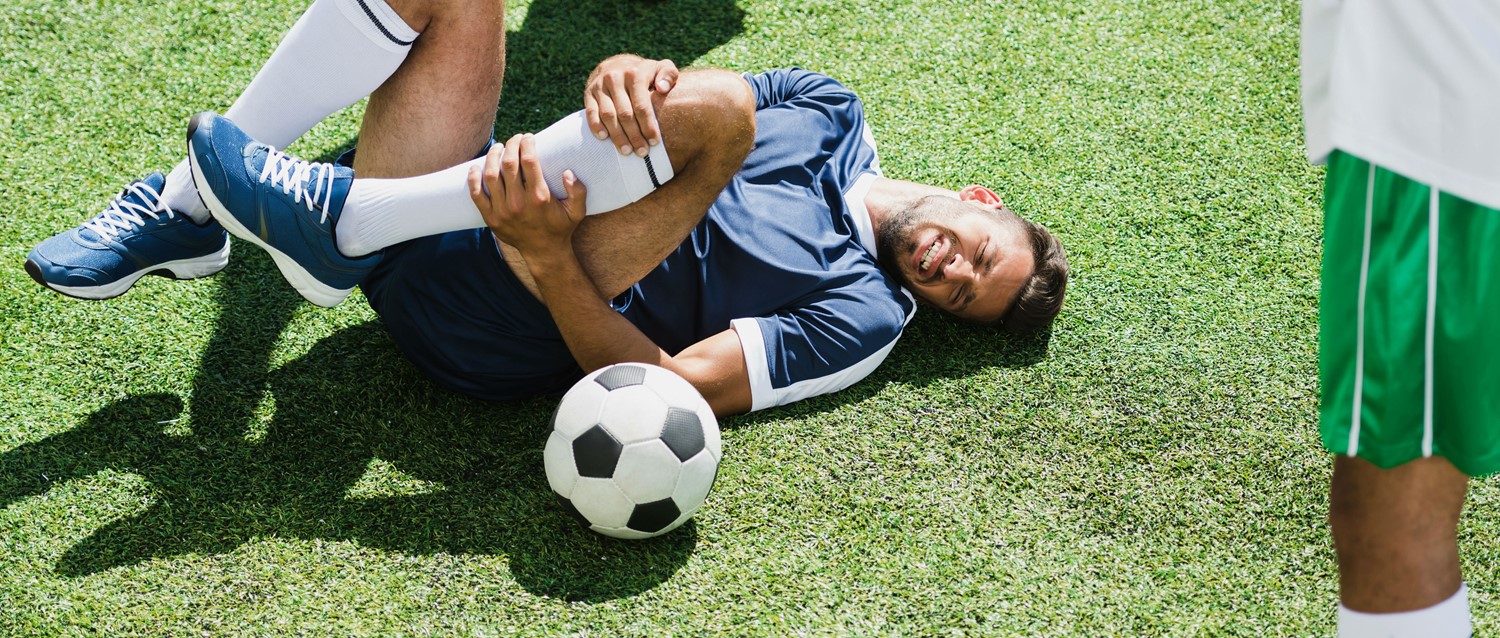
Why head injuries in sport need to be taken more seriously
Peer reviewed by Dr Sarah Jarvis MBE, FRCGPLast updated by Milly EvansLast updated 1 Aug 2019
Meets Patient’s editorial guidelines
- DownloadDownload
- Share
- Language
- Discussion
Head injuries are common across the sporting world. Often they can be very mild and symptoms can disappear in a matter of hours or days. However, sometimes a knock to the head, especially if there are multiple knocks in a short space of time, can lead to serious brain damage or even death.
In this article:
Video picks for Sports injuries
According to Headway, the brain injury association, there were 155,919 head injuries between 2016-2017 in the UK. Many, although certainly not all, of these were obtained through sports.
"The signs of concussion can often be delayed in their presentation. They are also notoriously hard to diagnose, which is why the charity has pushed so hard to promote an 'if in doubt, sit it out!' approach via its Concussion Aware campaign," says Luke Griggs, Deputy Chief Executive of Headway. Delayed presentation of symptoms means that many sports players can be allowed to return to play following a head injury, and risk further damage.
After receiving a concussion from a blow to the head or a sudden jolt, you may experience headaches, blurred vision or 'seeing stars', nausea, dizziness, fogginess, memory loss, feeling emotional or not being able to think straight. Only 1 in 10 people with concussion black out so you should never ignore other symptoms. If you black out for more than 15 minutes you may have a serious brain injury. The onset of other symptoms can be delayed, causing disturbed sleep, tiredness and irritability.
The most dangerous complication of head injury is extradural haematoma, a collection of blood in the 'potential' space between the skull and the outer protective lining of the brain. It usually occurs after a severe head injury in about 2 in 100 people. It is a serious condition which requires emergency treatment.
Continue reading below
'My life would be completely different'
Nic O'Leary was only 15 when he sustained a head injury whilst playing rugby for the Welsh Exiles. During training for a big match, the top of another man's head collided with his temple in a drill.
"I was very groggy but, wanting to continue, I managed to eventually join in with the next drill. I went down in a tackle and the second impact caused me to lose consciousness and stop breathing. The injury I was diagnosed with was damage to the frontal lobe."
As was the case for O'Leary, a further head injury, sustained before symptoms of the first one have subsided, can cause second impact syndrome (SIS), which can lead to physical, emotional and cognitive symptoms and even death. SIS is rare but can cause significant brain damage. Repeated concussions are also linked to other risks like dementia.
"The injury has severely impacted my life, with the damage affecting my emotions, as well as my executive functions. My short-term memory is extremely poor; I suffer from chronic fatigue; emotionally I suffer with depression and anxiety. I have attempted suicide. I struggle to hold down relationships. I've been unable to work over the last few years. I have not once felt like I am the same person I was before the injury," he says.
More awareness of SIS and the potentially devastating effects of concussion may have prevented Nic's injury and enabled him to live without the daily symptoms.
"If concussion had even been spoken about when I had my injury, I probably would have sat out for a couple of weeks with a sore head, and I'd have likely been fit and well in time for that all-important match, and my life would be completely different to the way it is now."
Where are we now?
Back to contentsWorld Rugby recently released new recommendations to prevent head injury in the sport, with chairman Sir Bill Beaumont reflecting that "while injury incidence in rugby is not on the rise and there has been a 15% reduction in concussions in elite competitions, now is not the time to become complacent". They are particularly focused on reducing risk in the tackle as it is responsible for half of match injuries and over three quarters of all concussions.
Whilst professional sports players, especially those in rugby and football, are at risk of head injury, they also have greater access to highly trained experts on the pitch who can properly assess their injuries. A large proportion of all sports-related head injuries are among children and young adults at junior sports clubs where there may be greater risk of injury but less support or awareness of the seriousness of concussion.
For players, as well as coaches, there is enormous pressure to continue play even after a head injury, as they feel rushed to get a game finished, especially in poor weather or if the game is nearly over. This results in players downplaying the severity of their symptoms or faking feeling well.
The typical tests like the Maddocks questions - which include asking "At what venue are we today?" and "Who scored last in this match?" - are useful but their sensitivity is broad, with accuracy identifying someone with a concussion ranging between 32-75%. Players may be able to manipulate their answers or guess in order to be allowed to go back on. Additionally, it may be difficult for a professional to diagnose a head injury accurately in the short time they have with a player amid the noise and distraction of a sports match, as well as the pressure to get on with the game.
Continue reading below
The future of concussion in sport
Back to contentsAs Griggs explains, a change in attitudes is currently the best way of preventing more head and brain injuries. "Certain sports, including rugby, have taken approaches to concussion management that involve monitoring the effectiveness and implementation of protocols and making changes where necessary. And, in general, progress is being made."
The ongoing Repetitive Concussion in Sport (RECOS) study in Birmingham is looking into creating a conclusive and objective test for concussion, protecting players against further head injury. The saliva test could diagnose concussions pitch-side within minutes by testing for biomarkers which can identify if the brain has sustained injury. After a decade of study, researchers have been using their laboratory test to look for the biomarkers in the saliva and urine of injured and non-injured Premier League footballers. They hope to develop a hand-held device which could be used by players in both professional and amateur sports.
For Nic, the idea of a test for concussion is hugely encouraging. "Research for an effective concussion test will be literally life-saving. As professional sportspeople - particularly tough young rugby players - it is instilled in us to 'carry on regardless'. There needs to be an effective way for this to be taken out of the control of the players."
Whilst an effective test for concussion gives hope for future prevention of concussion, it is important that the current focus remains on awareness of head injury, explains Griggs.
"Ultimately, until reliable sideline diagnostic tools have been developed and fully tested, the focus has to remain on education. We have to make everyone involved in sport, including players, coaches and parents, better aware of the dangers of continuing to play on after sustaining a potential concussion. Doing so will hopefully lead to more players taking the decision to sit themselves out, rather than risk the consequences."
Patient picks for Sports injuries

Bones, joints and muscles
When is it safe to return to sport after an injury?
If you’ve been injured playing football – or through any other sport – you’re probably impatient for the injury to heal so you can get back to normal. While the situation is most acute for professional sportspeople, who may miss important matches or even whole seasons, it can still be tough for ordinary people who have made sport a big part of their life.
by Abi Millar

Bones, joints and muscles
Beyond the burn: decoding the HYROX hype
HYROX is a global fitness race that blends diverse exercise disciplines into one challenging event. While the name might sound like a technical term, HYROX is actually a mashup of the words "hybrid" and "rock star." On TikTok and other social platforms, it has exploded in popularity, thanks to its visually dynamic workouts and variety-packed format. We spoke with an expert to explore whether this fitness phenomenon is right for everyone.
by Victoria Raw
Continue reading below
Article history
The information on this page is peer reviewed by qualified clinicians.
1 Aug 2019 | Latest version

Ask, share, connect.
Browse discussions, ask questions, and share experiences across hundreds of health topics.

Feeling unwell?
Assess your symptoms online for free
Sign up to the Patient newsletter
Your weekly dose of clear, trustworthy health advice - written to help you feel informed, confident and in control.
By subscribing you accept our Privacy Policy. You can unsubscribe at any time. We never sell your data.